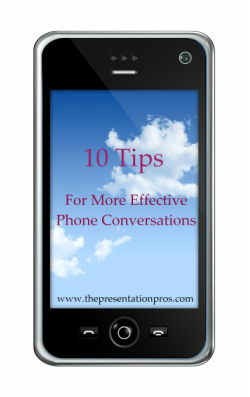
I am always amazed at some of the messages I receive on the phone. The phone is one of the most powerful communication tools we have in business and yet the stakes are higher when speaking on the phone. For one thing people lie more often on the phone than by any other means of communication. In-person communications make it more difficult to tell a lie because it is easier to spot. Letters, email and text messaging leave a paper trail allowing the lie to jump off the page. Because of this, the importance of how one goes about placing a phone call cannot be diminished.
The number of non-verbal cues we deliver is staggering. Without the visual reference which usually plays such a large part in communication, the listener is more tuned in than ever to your volume, pitch, pace, vocal inflection, overall speech patterns and the words themselves. Many research studies say our nonverbal communication is 4 times more powerful than the words we use. The old adage “It’s not what you said, it’s how you said it” has never been more true than in a phone conversation.
How effective would you say your phone conversations are? Do you get the interview, make the sale or get the referral? How would you rate yourself in the following areas from 1-10?
The number of non-verbal cues we deliver is staggering. Without the visual reference which usually plays such a large part in communication, the listener is more tuned in than ever to your volume, pitch, pace, vocal inflection, overall speech patterns and the words themselves. Many research studies say our nonverbal communication is 4 times more powerful than the words we use. The old adage “It’s not what you said, it’s how you said it” has never been more true than in a phone conversation.
How effective would you say your phone conversations are? Do you get the interview, make the sale or get the referral? How would you rate yourself in the following areas from 1-10?
- Warmth: Do you come across as friendly and approachable? Can the person hear the smile in your voice?
- Credibility: Do you sound competent, knowledgeable and believable?
- Confidence: Do you come across as strong and commanding—not arrogant?
Here are 10 Tips that can help you have more effective phone conversations.
1. Be Warm, Courteous and Engaging
When they answer the phone, always ask them if this is a convenient time to chat. If not ask them for a couple of options that will be better and then call when they say. Let them hear the smile in your voice. This is very important because this will help to build engagement.
2. Always Be Honest
Since we already know that phone conversations have the greatest propensity for dishonesty, make sure you hold the space for the most honest of communications to evolve. This entails holding yourself to the highest accountability. Don’t just tell the truth, let them hear the truth. To assure that the conversation as a whole maintains that level of honesty let the person you are talking with know that you will be taking notes on what you discuss in the call and will send them a confirmation email to make sure you are both on the same page and that you did not miss anything. Ask them if they would kindly look over what you send them and make any corrections or adjustments they think necessary. In this way you create a paper trail. This technique makes you look organized and detail oriented and serves as a great reference as you move forward.
3. First Impressions Matter
The first few words of your call often make the difference as to whether or not the rest of the call will be taken seriously or not. Make sure you have a nice deep diaphragmatic breath under you and that you are sitting upright and not hunched over. Speak slowly and clearly, enunciating your words and be sure to SMILE! Smiling loosens our jaw muscles and adds warmth to our voice. Make sure you do not have anything distracting open on your desk or computer. Close all email and focus on the call.
4. Confidence, Confidence and More Confidence
Studies show that the more testosterone you have “coursing through your body the more powerful and confident you feel and the better you perform…” This is true for both men and women. The easiest way to increase your testosterone levels is to Power Pose. Power Posing is literally taking up as much space as possible—a wide stance, arms stretched up in the air or on hips with elbows out as far as you can get them. The key is to make the body bigger. If you are only on the phone and not on Skype, you can stand up and power pose while you stand. Just make sure you don’t walk around as you’re standing. The listener will pick up the back and forth pacing in your voice.
- Credibility: Do you sound competent, knowledgeable and believable?
- Confidence: Do you come across as strong and commanding—not arrogant?
Here are 10 Tips that can help you have more effective phone conversations.
1. Be Warm, Courteous and Engaging
When they answer the phone, always ask them if this is a convenient time to chat. If not ask them for a couple of options that will be better and then call when they say. Let them hear the smile in your voice. This is very important because this will help to build engagement.
2. Always Be Honest
Since we already know that phone conversations have the greatest propensity for dishonesty, make sure you hold the space for the most honest of communications to evolve. This entails holding yourself to the highest accountability. Don’t just tell the truth, let them hear the truth. To assure that the conversation as a whole maintains that level of honesty let the person you are talking with know that you will be taking notes on what you discuss in the call and will send them a confirmation email to make sure you are both on the same page and that you did not miss anything. Ask them if they would kindly look over what you send them and make any corrections or adjustments they think necessary. In this way you create a paper trail. This technique makes you look organized and detail oriented and serves as a great reference as you move forward.
3. First Impressions Matter
The first few words of your call often make the difference as to whether or not the rest of the call will be taken seriously or not. Make sure you have a nice deep diaphragmatic breath under you and that you are sitting upright and not hunched over. Speak slowly and clearly, enunciating your words and be sure to SMILE! Smiling loosens our jaw muscles and adds warmth to our voice. Make sure you do not have anything distracting open on your desk or computer. Close all email and focus on the call.
4. Confidence, Confidence and More Confidence
Studies show that the more testosterone you have “coursing through your body the more powerful and confident you feel and the better you perform…” This is true for both men and women. The easiest way to increase your testosterone levels is to Power Pose. Power Posing is literally taking up as much space as possible—a wide stance, arms stretched up in the air or on hips with elbows out as far as you can get them. The key is to make the body bigger. If you are only on the phone and not on Skype, you can stand up and power pose while you stand. Just make sure you don’t walk around as you’re standing. The listener will pick up the back and forth pacing in your voice.
5. Keep the Volume UP
When we get nervous we have a tendency to drop our volume. This makes us sound less confident. This happens quite often in high stakes situations where we are afraid to ask for what we want. Let’s say you are ready to close a deal but you need a deposit. A confident voice would keep the volume up on all the words. We’re excited to be working with you and as soon as we receive the $1000 deposit we can begin. Watch where the leakage happens when we are not confident: We’re excited to be working with you and as soon as we receive the $1000 deposit we can begin. The volume goes down on the dollar amount letting the individual know that figure is open for negotiation. The key is to keep the same volume level, not to increase it drastically. That would sound fake.
6. Build Rapport
While it’s more difficult to build rapport on the phone than in person, it’s not impossible. The hormone that makes us feel a strong connection to someone is called Oxytocin. While it’s produced primarily through in person contact since it involves mutual eye contact and physical touch, it can be replicated. You can use Skype to make your calls and turn the video function on. This is a great way to be able to have the eye contact. If this is not possible, you can bring up their website or social media profiles with any pictures they may have. This helps your brain know it is talking with a real person.
7. Vocal Pitch and Inflection
Studies show that higher pitched voices do not have the credibility that deeper voices have. To make sure you are speaking in the lowest tone of your natural vocal range take a couple of deep diaphragmatic breaths, keeping your shoulders down, your neck, jaw and tongue relaxed. Always speak on the out breath. This is very useful to know if you start to feel nervous. Just take a few deep breaths and relax yourself and then continue to speak on the out breath. Oxygen is nature’s greatest tranquilizer. In terms of inflection always make sure you say your statements and ask your questions. Quite often people go up at the end of their sentences creating a question effect. If in fact you are asking a question that is one thing, but if you are going up at the end of a statement it signifies a lack of confidence in what you are saying. Quite often people will introduce themselves to me and have the question at the end of the introduction ie. “My name is Susan Myers? I’ve been wanting to meet you for quite some time? I was wondering if you might be free to get a cup of coffee?” While I made the name up, I have heard this kind of inflection more than I care to admit. Making everything a question makes you look less confident and far from credible. I always think of a “Valley Girl” when I hear this inflection.
8. Don’t Use a Script
I used to do voiceovers for a living and nothing is more horrifying to me on the phone than when someone tries to read me a pre-written script. I always stop them, tell them to read the script to themselves and then deliver me the gist of the script in their own words. At that time, I can decide whether or not I am interested in hearing more. Scripts are used a lot in telemarketing, cold calling and customer service calls. Anything that is repeated in the same way over and over becomes memorized and without emotion or passion. Since emotion and passion are what drive sales, I have never understood why anyone uses a script. Scripting blocks rapport instead of building it. Just as with speaking in person, create a sparse outline of the topics you wish to cover in the order you wish to cover them in. This will allow you to be fresh every time. It will also allow you to go with the flow of the conversation.
9. Convey Passion and Emotion
I am sure you have all heard that “facts tell, emotions sell”. Emotions can be readily heard through the vocal tone. We have trouble building rapport with people who have no emotion in their voices. While the logical information of data and stats are important, they do not take the place of the emotions. The fastest way to build rapport is through passion and emotion. People who are charismatic are open to sharing their passions with others. They are open and excited about many topics. They also are great at getting others to open up about their passions as well. The most important way you can build engagement is through the use of stories. Not just the stories you tell but also opening the engagement for the listener to share their stories. When you can tap into the other person’s emotions, they feel more engaged and connected to you.
10. Voicemail Messages and Announcements
I am amazed at how many people ramble on and on in their voice messages and then rattle off their phone number at lightning speed. There are two things people really need in order to get back to you and they should both be said slowly and with great articulation—your name and your phone number.
I can’t tell you how many times I haven’t been able to get back to someone because they mumbled their name or number. This does not send a very credible message. Whether you are leaving a voicemail message for someone else or setting up the voicemail announcement a caller will hear, there are a few things to take into consideration. Make sure that you are relaxed when you are recording your voice mail message or announcement. Make sure you are speaking in your lower register with that nice supportive diaphragmatic breath. Make sure you are in a quiet place and make sure you are smiling when you are recording the message. Studies show that 16 different types of smiles can be identified by voice tone alone. Always make sure you play the message back before you hit send.
When you are recording a voicemail announcement the person calling you wants to know when they can expect a return call so you want to include a nice greeting, your name, the date and your availability. When you record a voice mail message to send you want to include a nice greeting, your name and number at the beginning, your message and then your name and number again at the end. Please be slow and enunciate your name and number. If you have a difficult name, spell it for the listener. It is important that you give your name and number at the beginning and end of your message. You don’t want to make someone listen to your entire message again just to get the name and number. They may not think it is important to write it down the first time but then realize after hearing your message that they need to return your call immediately. By putting your name and number at the beginning, you are showing you are courteous of their time. Also, even if you think the person knows your number, leave it anyway. The person may have your number on speed dial and does not have access to the number.
By using these 10 tips you’ll find you’re more effective on the phone and are able to build rapport and credibility quickly, easily and far more often.
Debbie Darling, ©2015 The Presentation Pros
Read more of The Presentation Pros blog HERE.
When we get nervous we have a tendency to drop our volume. This makes us sound less confident. This happens quite often in high stakes situations where we are afraid to ask for what we want. Let’s say you are ready to close a deal but you need a deposit. A confident voice would keep the volume up on all the words. We’re excited to be working with you and as soon as we receive the $1000 deposit we can begin. Watch where the leakage happens when we are not confident: We’re excited to be working with you and as soon as we receive the $1000 deposit we can begin. The volume goes down on the dollar amount letting the individual know that figure is open for negotiation. The key is to keep the same volume level, not to increase it drastically. That would sound fake.
6. Build Rapport
While it’s more difficult to build rapport on the phone than in person, it’s not impossible. The hormone that makes us feel a strong connection to someone is called Oxytocin. While it’s produced primarily through in person contact since it involves mutual eye contact and physical touch, it can be replicated. You can use Skype to make your calls and turn the video function on. This is a great way to be able to have the eye contact. If this is not possible, you can bring up their website or social media profiles with any pictures they may have. This helps your brain know it is talking with a real person.
7. Vocal Pitch and Inflection
Studies show that higher pitched voices do not have the credibility that deeper voices have. To make sure you are speaking in the lowest tone of your natural vocal range take a couple of deep diaphragmatic breaths, keeping your shoulders down, your neck, jaw and tongue relaxed. Always speak on the out breath. This is very useful to know if you start to feel nervous. Just take a few deep breaths and relax yourself and then continue to speak on the out breath. Oxygen is nature’s greatest tranquilizer. In terms of inflection always make sure you say your statements and ask your questions. Quite often people go up at the end of their sentences creating a question effect. If in fact you are asking a question that is one thing, but if you are going up at the end of a statement it signifies a lack of confidence in what you are saying. Quite often people will introduce themselves to me and have the question at the end of the introduction ie. “My name is Susan Myers? I’ve been wanting to meet you for quite some time? I was wondering if you might be free to get a cup of coffee?” While I made the name up, I have heard this kind of inflection more than I care to admit. Making everything a question makes you look less confident and far from credible. I always think of a “Valley Girl” when I hear this inflection.
8. Don’t Use a Script
I used to do voiceovers for a living and nothing is more horrifying to me on the phone than when someone tries to read me a pre-written script. I always stop them, tell them to read the script to themselves and then deliver me the gist of the script in their own words. At that time, I can decide whether or not I am interested in hearing more. Scripts are used a lot in telemarketing, cold calling and customer service calls. Anything that is repeated in the same way over and over becomes memorized and without emotion or passion. Since emotion and passion are what drive sales, I have never understood why anyone uses a script. Scripting blocks rapport instead of building it. Just as with speaking in person, create a sparse outline of the topics you wish to cover in the order you wish to cover them in. This will allow you to be fresh every time. It will also allow you to go with the flow of the conversation.
9. Convey Passion and Emotion
I am sure you have all heard that “facts tell, emotions sell”. Emotions can be readily heard through the vocal tone. We have trouble building rapport with people who have no emotion in their voices. While the logical information of data and stats are important, they do not take the place of the emotions. The fastest way to build rapport is through passion and emotion. People who are charismatic are open to sharing their passions with others. They are open and excited about many topics. They also are great at getting others to open up about their passions as well. The most important way you can build engagement is through the use of stories. Not just the stories you tell but also opening the engagement for the listener to share their stories. When you can tap into the other person’s emotions, they feel more engaged and connected to you.
10. Voicemail Messages and Announcements
I am amazed at how many people ramble on and on in their voice messages and then rattle off their phone number at lightning speed. There are two things people really need in order to get back to you and they should both be said slowly and with great articulation—your name and your phone number.
I can’t tell you how many times I haven’t been able to get back to someone because they mumbled their name or number. This does not send a very credible message. Whether you are leaving a voicemail message for someone else or setting up the voicemail announcement a caller will hear, there are a few things to take into consideration. Make sure that you are relaxed when you are recording your voice mail message or announcement. Make sure you are speaking in your lower register with that nice supportive diaphragmatic breath. Make sure you are in a quiet place and make sure you are smiling when you are recording the message. Studies show that 16 different types of smiles can be identified by voice tone alone. Always make sure you play the message back before you hit send.
When you are recording a voicemail announcement the person calling you wants to know when they can expect a return call so you want to include a nice greeting, your name, the date and your availability. When you record a voice mail message to send you want to include a nice greeting, your name and number at the beginning, your message and then your name and number again at the end. Please be slow and enunciate your name and number. If you have a difficult name, spell it for the listener. It is important that you give your name and number at the beginning and end of your message. You don’t want to make someone listen to your entire message again just to get the name and number. They may not think it is important to write it down the first time but then realize after hearing your message that they need to return your call immediately. By putting your name and number at the beginning, you are showing you are courteous of their time. Also, even if you think the person knows your number, leave it anyway. The person may have your number on speed dial and does not have access to the number.
By using these 10 tips you’ll find you’re more effective on the phone and are able to build rapport and credibility quickly, easily and far more often.
Debbie Darling, ©2015 The Presentation Pros
Read more of The Presentation Pros blog HERE.





